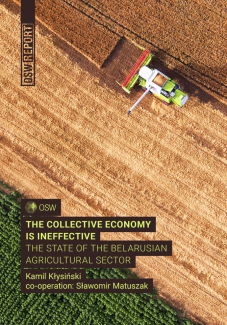The collective economy is ineffective

When compared to other sectors of the Belarusian economy, agriculture is most affected by the country’s Soviet heritage. Since Belarus regained independence, large state-owned farms operating on the basis of the former sovkhozes and kolkhozes have invariably dominated the agricultural sector. Belarus’s agricultural model has effectively been petrified by numerous legal restrictions regarding the purchase, transfer and conversion of agricultural and forest land. Under the 2008 Agricultural Code, these issues are directly supervised by Alyaksandr Lukashenka. For many years, Belarus’s agricultural sector has grappled with a manpower shortage, which results from an increasing depopulation of the countryside and the reluctance of the remaining residents to seek employment in that sector. Due to unfavourable weather conditions and the poor quality of most of its soil, the Belarusian agricultural sector is unable to ensure the country self-sufficiency, even as regards the production of plants. However, it remains the case that agriculture is one of the most important sources of export revenue. The potential for generating a production surplus, which is then exported, is mainly seen in the dairy industry. The Belarusian agricultural sector is also capable of organising an efficient and highly profitable production in selected areas, for example in rapeseed processing.




